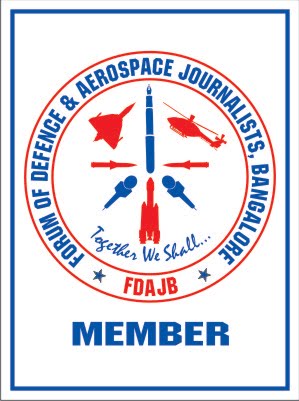(Press Release)
Dr APJ Abdul Kalam, the former President of India inaugurated a seminar on “Technology-Enabled Training” at the Indian Naval Academy at Ezhimala today. This seminal and maiden seminar at INA Ezhimala is a landmark event with a congregation of distinguished luminaries from various organisations including academia, industry and the Indian Armed Forces. Many senior officers, including Lt Gen K Surendra Nath, PVSM, AVSM, VSM, General Officer Commanding-in-Chief, Army Training Command, Lt Gen VK Saxena, VSM, Commandant, Army Air Defence College, distinguished academicians like Prof Kannan M Moudgalya from IIT Bombay and representatives from the industry are taking part in this seminar.
The Opening Address was delivered by the Commandant of the Indian Naval Academy, Vice Admiral Pradeep Chauhan, AVSM, VSM. The highlight of the day’s proceedings was the Keynote Address by Dr APJ Abdul Kalam, the Chief Guest, in which he said technology empowers the learning process however technology cannot replace or one cannot underestimate teacher’s role as he becomes a mentor or facilitator for learning process. He advised educational institutions to use more and more virtual learning tools like virtual labs etc.
The cadets of INA and the delegates were visibly inspired by Dr Kalam’s delivery and had animated discussions with him after his address. The high standard of the papers presented today are a clear indicator of the quality of the excellence of the training being imparted in the Armed Forces in general and at the Indian Naval Academy in particular. Our Armed Forces are acutely conscious of the need to adopt the most modern practices in all areas of training and learning. The seminar serves to broaden the horizons of trainers and the trainees alike, and has shown how technology-oriented training can be put to excellent use.
The Indian Naval Academy received an overwhelming response for its call for papers and over sixty papers were received from a variety of training organisations, corporates involved in technology-based education, and, training establishments of the three Armed Forces. The seminar is scheduled to run over two days, with a total of eleven papers being presented. Of these, six were presented today. All the papers focus upon the positive impact of technology in the field of education and seek to document the manner in which technology-enabled training has leapfrogged over traditional methods, especially in the last two decades, with entrepreneurs, corporates and the Ministry of Human Resource Development, Government of India all playing critical roles. The papers also stress the advancements that have been made in Information, Communication and Computing Technologies (ICT), which have brought about a sea-change in the outlook of institutions of higher education, in respect of sharing their reservoirs of knowledge and competence. In addition to the training organisations of the Armed Forces, the seminar is being attended by academicians from a number of Engineering Colleges of the Malabar region. All in all, the initiative taken by the INA has been an intellectually exciting and effervescent affair.
Dr APJ Abdul Kalam, the former President of India inaugurated a seminar on “Technology-Enabled Training” at the Indian Naval Academy at Ezhimala today. This seminal and maiden seminar at INA Ezhimala is a landmark event with a congregation of distinguished luminaries from various organisations including academia, industry and the Indian Armed Forces. Many senior officers, including Lt Gen K Surendra Nath, PVSM, AVSM, VSM, General Officer Commanding-in-Chief, Army Training Command, Lt Gen VK Saxena, VSM, Commandant, Army Air Defence College, distinguished academicians like Prof Kannan M Moudgalya from IIT Bombay and representatives from the industry are taking part in this seminar.
The Opening Address was delivered by the Commandant of the Indian Naval Academy, Vice Admiral Pradeep Chauhan, AVSM, VSM. The highlight of the day’s proceedings was the Keynote Address by Dr APJ Abdul Kalam, the Chief Guest, in which he said technology empowers the learning process however technology cannot replace or one cannot underestimate teacher’s role as he becomes a mentor or facilitator for learning process. He advised educational institutions to use more and more virtual learning tools like virtual labs etc.
The cadets of INA and the delegates were visibly inspired by Dr Kalam’s delivery and had animated discussions with him after his address. The high standard of the papers presented today are a clear indicator of the quality of the excellence of the training being imparted in the Armed Forces in general and at the Indian Naval Academy in particular. Our Armed Forces are acutely conscious of the need to adopt the most modern practices in all areas of training and learning. The seminar serves to broaden the horizons of trainers and the trainees alike, and has shown how technology-oriented training can be put to excellent use.
The Indian Naval Academy received an overwhelming response for its call for papers and over sixty papers were received from a variety of training organisations, corporates involved in technology-based education, and, training establishments of the three Armed Forces. The seminar is scheduled to run over two days, with a total of eleven papers being presented. Of these, six were presented today. All the papers focus upon the positive impact of technology in the field of education and seek to document the manner in which technology-enabled training has leapfrogged over traditional methods, especially in the last two decades, with entrepreneurs, corporates and the Ministry of Human Resource Development, Government of India all playing critical roles. The papers also stress the advancements that have been made in Information, Communication and Computing Technologies (ICT), which have brought about a sea-change in the outlook of institutions of higher education, in respect of sharing their reservoirs of knowledge and competence. In addition to the training organisations of the Armed Forces, the seminar is being attended by academicians from a number of Engineering Colleges of the Malabar region. All in all, the initiative taken by the INA has been an intellectually exciting and effervescent affair.
























